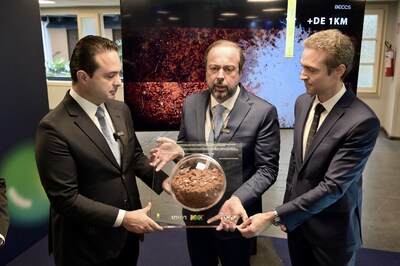
FS Confirms Geological Feasibility of BECCS Project and Will Be Able to Produce the World's First Carbon-negative Ethanol
Published by Todd Bush on May 30, 2024
By capturing and storing carbon in Lucas do Rio Verde plant, Brazil's first corn ethanol industry could also be the first to produce carbon-negative ethanol
LUCAS DO RIO VERDE, Brazil, May 29, 2024 /PRNewswire/ -- FS, one of the largest producers of ethanol and animal nutrition in Brazil, has just completed technical studies that prove suitable geological conditions for injecting carbon dioxide (CO2), emitted in the fermentation phase of biofuel production, in the subsoil. Hence, the company can become the world's first ethanol producer with a negative carbon footprint and the first to develop BECCS technology (acronym in English for bioenergy production with carbon capture and storage) in the production of ethanol outside the U.S., as announced by Brazil's Minister of Mines and Energy, Alexandre Silveira, during the 3rd Energy Transition Working Group, G20 meeting, which took place in the Brazilian state of Minas Gerais.

left to right: Evandro Gussi, President of the Sugarcane and Bioenergy Industry Union (UNICA); Alexandre Silveira, Brazil's Minister of Mines and Energy; and Rafael Abud, CEO of FS_Photo Credit:_Ricardo Botelho_MME
>> In Other News: Navigating the Natural Gas Nexus: Unraveling the Whistler Pipeline-Enbridge Joint Venture
The adoption of the technology will prevent the release of approximately 423 thousand tons of CO2 into the atmosphere per year by the industry's operation in Lucas do Rio Verde (MT). Subsequently, the solution can be implemented in other industrial units of the company, reaching a potential for removing CO2 from the atmosphere of more than 1.8 million tons of carbon per year.
The technology is an innovative solution for capturing carbon, one of the main causes of the greenhouse effect, and injecting it underground into deep geological layers, where it will be safely stored for thousands of years, without influencing global warming.
FS, which has been working on this project for 4 years, drilled a stratigraphic well approximately 2,000 meters deep in October 2023 to examine rock formations in the area below its Lucas do Rio Verde industry. Studies concluded that the Diamantino rock formation, located in the Parecis Basin in Mato Grosso, has adequate porosity and permeability conditions to receive CO2 to be injected at a depth of more than 800 meters.
Currently, there are only two ethanol producers in the world with BECCS technology in operation, both in the United States. Mato Grosso's industry, however, will be the first carbon-negative industry, as it only uses second-crop corn as a raw material and renewable biomass from planted forests as an energy source.
"The technical study's result is an essential milestone to encourage the next steps necessary to unlock investments in BECCS technology by the ethanol sector. Now what we need is the advancement of regulation and carbon trading markets", says FS CEO, Rafael Abud. "In addition to utilization in automobiles, ethanol produced with the technology can be used to produce sustainable aviation fuel (SAF) and marine fuel, making Brazilian ethanol increasingly one of the largest contributors to the world's energy transition", he adds.
As soon as the senate approves the regulation of the activity – included in the bill for the Fuel of the Future program –, FS will invest an additional R$350 million in the implementation of equipment to capture, dehydrate, compress and inject CO2 underground. Work could begin later this year, with completion scheduled for the end of 2025. Around 230 direct jobs will be created during well drilling, construction and assembly of CO2 compression and dehydration equipment. Recently, the project had the financial support of FINEP, a public agency that promotes innovation and works with a focus on strategic, structuring and impactful actions for sustainable development in Brazil.
According to FS's Vice President of Sustainability and New Business, Daniel Lopes, "This is a crucial step towards achieving FS's vision, which is to be the largest producer of carbon-negative fuel in the world. We will now dedicate our efforts to monetizing this project through the sale of carbon credits, and await the approval of the legal framework by the Senate", he comments.
Subscribe to the newsletter
Daily decarbonization data and news delivered to your inbox
Follow the money flow of climate, technology, and energy investments to uncover new opportunities and jobs.
Latest issues
-
Can Koloma Crack Iowa's Billion-Year-Old Secret?
Inside This Issue ⛏️ Iowa's Hydrogen Rush: Can Koloma Strike Gold Before Rules Kick In? ✈️ Bentley Commits to Use 100% Sustainable Aviation Fuel for Car Airfreight 🌬️ Minister Parrott Provides Upd...
-
$47M Just Poured Into This SAF Producer
Inside This Issue 💰 LanzaJet Announces $47M in New Capital and First Close of Equity Round at $650M Pre-Money Valuation 🚢 Maersk's Ethanol Bet Could Reshape U.S. Fuel Markets 🪨 Canada Nickel and t...
-
Kita's $29M Bet Signals Carbon Insurance Is Here
Inside This Issue 🛡️ Kita's $29M Bet Signals Carbon Insurance Is Here 🏗️ CCI BioEnergy Selects Arcadis As Design-Engineer Partner Under Master Service Agreement 🤝 Tapestry and Climeworks Announce ...
Company Announcements
-
Climeworks Establishes Canadian Headquarters in Calgary
Calgary, Alberta, February 20, 2026 — Climeworks, a global leader in commercial carbon removal, has established its Canadian headquarters at Calgary’s ETC, one of Alberta’s leading hubs where start...
-
MIAMI, Feb. 24, 2026 /CNW/ - Power Sustainable Infrastructure Credit ("PSIC") recently closed an $85M senior secured financing for Sagepoint Energy ("Sagepoint"), a vertically integrated renewable ...
-
HALIFAX, NS, Feb. 24, 2026 /CNW/ - The Nova Scotia Salmon Association (NSSA) is celebrating a significant advancement in climate action and watershed restoration as Royal Bank of Canada purchases a...
-
Honeywell International: Process Technology to Help Verso Energy Accelerate eSAF Production
CHARLOTTE, N.C., Feb. 24, 2026 - Honeywell today announced that Verso Energy, an integrated energy company focused on producing low-carbon molecules, will use Honeywell UOP's eFiningTM methanol-to-...